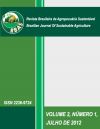LEVELS OF CHOLINE SUPPLEMENTATION IN THE DIET OF LAYING JAPANESE QUAILS
DOI:
https://doi.org/10.21206/rbas.v2i1.66Abstract
The objective was to evaluate different levels of supplementation of choline in the diet of laying Japanese quails in lay. It was used 224 female subspecies Japanese quail (Coturnix coturnix japonica) with 155 days of age, in the randomized experimental design with four treatments and seven replicates and eight birds per experimental unit. The treatments consisted of inclusion levels of choline per kg diet (0; 500; 1,000 and 1,500mg/kg). The parameters studied were: feed intake, egg production, egg weight, egg mass, feed conversion by egg mass, feed conversion per dozen eggs, egg production marketable, percentage and weight of the eggs (yolk, albumen and shell) and specific gravity. There was no significant difference for any parameter studied. It was concluded that there is no need for the inclusion of choline in the diet of laying Japanese quails when they are fed diets containing a ratio of 84% methionine plus cystine to lysine.Downloads
Download data is not yet available.
Downloads
Published
2012-07-01
How to Cite
Renata de Souza Reis, Sérgio Luiz de Toledo Barreto, Eriane de Paula, Jorge Cunha Lima Muniz, Gabriel da Silva Viana, Raquel Mencalha, & Lívia Maria dos Reis Barbosa. (2012). LEVELS OF CHOLINE SUPPLEMENTATION IN THE DIET OF LAYING JAPANESE QUAILS . Brazilian Journal of Sustainable Agriculture, 2(1). https://doi.org/10.21206/rbas.v2i1.66
Issue
Section
Artigos
License
1. Proposta de Política para Periódicos de Acesso Livre
Autores que publicam nesta revista concordam com os seguintes termos:
Autores mantém os direitos autorais e concedem à revista o direito de primeira publicação, com o trabalho simultaneamente licenciado sob a Licença Creative Commons Attribution que permite o compartilhamento do trabalho com reconhecimento da autoria e publicação inicial nesta revista.











